Don't wanna be here? Send us removal request.
Text
Introducing Trans Light Electricals, your go-to source for high-quality rubber coated electrical cable. When it comes to industrial operations, we understand the importance of efficiency, safety, and reliability. Trust us to provide you with the perfect solution for all your cable needs. Welcome to a world of top-notch quality and unparalleled performance!
0 notes
Text
The Top 5 Rubber Power Cables for Electrical Safety and Efficiency
Rubber power cables are essential for ensuring electrical safety and efficiency in various applications. The top 5 rubber power cables offer reliable insulation and durability, making them suitable for a wide range of electrical installations. These cables are designed to withstand harsh environments, extreme temperatures, and mechanical stresses, thus reducing the risk of electrical accidents and enhancing overall performance.

With their superior flexibility and resistance to abrasion, chemicals, and oils, these cables ensure reliable power transmission while maintaining optimal safety standards. Whether it's for residential, commercial, or industrial use, investing in the top 5 rubber power cables guarantees both safety and efficiency in electrical operations.
1. XHHW-2 Cable: XHHW-2 cables are widely used in commercial and industrial applications due to their excellent electrical and thermal properties. These cables have a high resistance to heat, moisture, and chemicals, making them suitable for outdoor installations. They are also rated for direct burial, making them a reliable option for underground applications.
2. Type W Cable: Type W cables are heavy-duty power cables commonly used in mining, industrial, and construction sites. They are designed to withstand harsh environments, including exposure to oil, chemicals, and extreme temperatures. Type W cables are recognized for their durability and flexibility, making them easy to install and move around job sites.
3. SOOW Cable: SOOW cables are highly flexible, portable power cables commonly used in temporary or movable electrical equipment. They are resistant to oil, water, and sunlight, making them suitable for both indoor and outdoor applications. SOOW cables have a wide temperature range, allowing them to be used in various environments.
4. Tray Cable: Tray cables are multi-conductor cables designed for installation in trays, ducts, and other raceways. They are constructed with a thermoset or thermoplastic jacket, providing excellent resistance to moisture, abrasion, and chemicals. Tray cables are often used in industrial settings where reliability and performance are crucial.
5. SJOW Cable: SJOW cords are flexible power cables commonly used in household applications, as well as in small portable electrical equipment. They are resistant to oil, water, and mechanical stress, and can be used in both indoor and outdoor environments. SJOW cables are known for their versatility and ease of installation.
These top 5 rubber power cables are chosen for their safety and efficiency in different electrical applications. They are designed to withstand harsh conditions, provide reliable power transmission, and ensure the overall electrical system's performance and longevity.
0 notes
Text
Looking for reliable power distribution solutions in Dubai? Trans Light has got you covered! Our premium power distro board is designed to ensure seamless power management for all your applications. With a focus on reliability, safety, and efficiency, our range of distribution boards are perfect for various industries. Say goodbye to power interruptions and explore our top-tier products today!
0 notes
Text
Looking for reliable and durable cable ties? Look no further! Trans Light Electricals offers a wide range of high-quality rubber cable ties in various sizes and vibrant colors. Perfect for managing and organizing electric wires and cables, these cable ties are a must-have for any electrical project. Trust Trans Light for all your cable tie needs!
0 notes
Text
Looking for high-quality rubber cables? Look no further! Trans Light is the leading supplier of Flexible Rubber Cables in Dubai. Our H07RN-F cables offer the perfect combination of flexibility and strength, ensuring uninterrupted power supply for your electrical equipment and portable devices. Designed to withstand bad weather, grease, and thermal stress, these cables reduce the risk of fire and provide ultimate protection. With compounds like Rubber (EPR), Chlorosulphonated, and Ethylene, our cables are suitable for various applications. Whether it's for mobile services or fixed installations, our rubber cables are the ideal choice for all your power supply needs. Visit Us: https://translight.me/rubber-flexible-cables-suppliers/
rubber cable
0 notes
Text
The Ultimate Guide to Choosing the Right Rubber Cable Ties for Your Project
Are you working on a project that requires the use of rubber cable ties? With so many options available in the market, it can be overwhelming to choose the right ones for your specific needs. But don't worry, we've got you covered! In this ultimate guide, we will walk you through the important factors to consider when selecting rubber cable ties for your project. By the end of this post, you'll be equipped with the knowledge to make the perfect choice. Let's get started!
1. Determine the Strength Requirement
The first step in choosing the right rubber cable ties is to determine the strength requirement for your project. Consider the weight and size of the items you will be securing with the cable ties. If you're working with heavy objects, opt for cable ties with higher tensile strength to ensure they can withstand the load.
2. Assess the Environmental Conditions
Next, assess the environmental conditions in which the cable ties will be used. Are they going to be exposed to extreme temperatures, moisture, or chemicals? If so, you'll need to choose cable ties that are specifically designed to withstand these conditions. Look for ties that are labeled as weather-resistant, UV-resistant, or chemical-resistant, depending on your project needs.
3. Consider the Length and Width
The length and width of the cable ties are crucial factors to consider. Measure the diameter of the items you'll be securing to determine the appropriate length of the ties. It's important to choose cable ties that are long enough to wrap around the items comfortably without being too loose or too tight. Additionally, consider the width of the ties to ensure they provide enough strength and stability.
4. Decide on the Locking Mechanism
Rubber cable ties come with different types of locking mechanisms, such as self-locking, releasable, or double-locking. The choice of locking mechanism depends on the level of adjustability and reusability you require for your project. Self-locking cable ties provide a secure and permanent hold, while releasable ties allow for easy adjustments and reusability.
5. Evaluate the Material Quality
The material quality of rubber cable ties plays a significant role in their durability and longevity. Look for cable ties made from high-quality rubber or nylon materials that are known for their strength and resistance to wear and tear. Avoid choosing cheap and flimsy options, as they may break easily and compromise the integrity of your project.
6. Consider the Color and Aesthetic Appeal
Although not a crucial factor, the color and aesthetic appeal of the cable ties can be important, especially if they will be visible in your project. Choose a color that complements the overall look or blends well with the surroundings. Some cable ties even come in different patterns or designs, allowing you to add a touch of creativity to your project.
7. Compare Prices and Brands
Lastly, compare prices and brands to ensure you're getting the best value for your money. Look for reputable brands that have positive reviews and a track record of producing high-quality products. Consider the pricing options and choose cable ties that fit within your budget without compromising on quality.
Choosing the right rubber cable ties for your project doesn't have to be overwhelming. By following these steps and considering the important factors, you can confidently select the perfect cable ties that meet your specific needs. Remember to prioritize strength, assess environmental conditions, consider length and width, decide on the locking mechanism, evaluate material quality, and consider color and aesthetic appeal. With the right cable ties in hand, you'll be well-equipped to complete your project successfully.
0 notes
Text
Extension Cord Safety: What You Need to Know
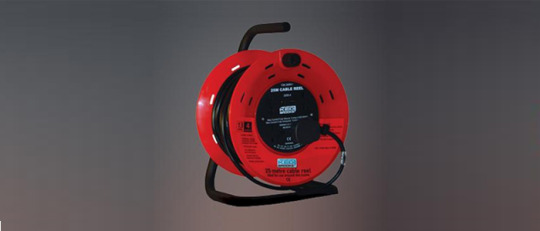
Do you rely heavily on extension cords in your daily life? Whether it’s for powering multiple electronic devices or reaching a distant power outlet, extension cords play a crucial role in providing convenience and flexibility. However, it’s important to use them safely to avoid potential dangers such as electrical shocks or fire hazards. In this blog post, we will discuss extension cord safety and provide you with essential tips to keep in mind when using them.
1. Choose the Right Extension Cord for the Job
Selecting the appropriate extension cord for your needs is crucial to ensure safety. Different extension cords are designed for different purposes, and using the wrong type can be risky. Make sure the cord is rated for the intended use, considering factors such as voltage, amperage, and wattage.
2. Inspect Cords for Damage
Before using an extension cord, it’s essential to thoroughly inspect it for any signs of damage or wear. Look for frayed or exposed wires, cracked or broken plugs, or loose connections. Using a damaged cord can lead to electrical shock or even start a fire.
3. Avoid Overloading Extension Cords
Overloading an extension cord can cause overheating and potentially lead to a fire. Be mindful of the cord's amp rating and ensure that the total wattage of the devices or appliances plugged into it does not exceed the cord's capacity. If you require multiple devices on the same cord, consider using a power strip with built-in surge protection.
4. Keep Extension Cords Away from Water and Heat Sources
Never use an extension cord near water or damp areas, as this can increase the risk of electrical shock. Additionally, avoid placing cords near sources of heat, such as heaters or radiators, as the heat can damage the cord's insulation and lead to a fire.
5. Do Not Use Extension Cords Permanently
Extension cords are designed for temporary use. They should never be used as a permanent solution for powering appliances or devices. If you find yourself relying on extension cords on a regular basis, consider consulting an electrician to install additional outlets in your home or workspace.
6. Do Not Tightly Coil or Cover Extension Cords
It's important to avoid tightly coiling or covering extension cords, as this can cause them to overheat. The heat generated by tightly wound cords has no way to dissipate, potentially leading to insulation damage or even fire. Instead, loosely coil cords when not in use to allow for adequate airflow.
7. Unplug Extension Cords Properly
When unplugging devices from an extension cord, make sure to grip the plug firmly and pull it straight out from the outlet. Avoid pulling the cord itself, as this can cause damage to the cord or the plug, resulting in a potential safety hazard.
By following these essential safety tips, you can ensure that your use of extension cords is both convenient and secure. Keep in mind that practicing good cord safety not only protects you and your property but also minimizes the risk of electrical accidents. Stay safe and enjoy the flexibility that extension cords provide!
0 notes
Text
Understanding Electrical Cables: A Beginner's Guide
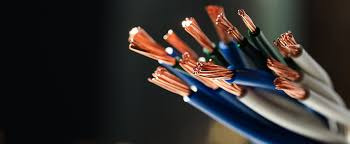
When it comes to electrical installations, it's essential to understand the basics of electrical cables. Electrical cables play a crucial role in transmitting electrical power from one point to another. However, it can be challenging to understand the different types of cables and their functions, especially for beginners. Here's a beginner's guide to understanding electrical cables:
1. What Are Electrical Cables?
Electrical cables are insulated conductors made up of one or more wires that transmit electrical power from one point to another. The wires used in electrical cables can be made from various materials, such as copper, aluminum, and steel. Each material has its advantages and disadvantages depending on the intended use of the cable.
2. Understanding Electrical Cable Ratings
Electrical cables come in various ratings that specify their intended use. Understanding these ratings is crucial when choosing the right cable for a particular application. The most common ratings are voltage, current carrying capacity, and temperature rating.
3. Types of Electrical Cables
There are several types of electrical cables, each designed for a particular application. The most common types include:
- Coaxial Cables
- Twisted Pair Cables
- Fiber Optic Cables
- Power Cables
4. Cable Insulation Materials
The insulation on electrical cables plays a critical role in protecting the wires from damage and preventing electrical shorts. Different insulation materials have different characteristics that make them suitable for specific applications. The most common insulation materials include PVC, Teflon, and rubber.
5. Cable Sizes and Colors
Cable size refers to the cross-sectional area of the wire in the cable. The larger the wire's diameter, the more current it can carry safely. Electrical cables also come in various colors, with each color indicating its intended use. For instance, black cables are usually used for hot wires, white cables for neutral wires, and green or bare wires for grounding.
6. Safety Precautions
Working with electrical cables can be hazardous if not done correctly. Always ensure that you follow the manufacturer's instructions, use the proper tools, and wear appropriate safety gear. Additionally, if you're not sure about a particular cable's application, it's best to consult an expert before using it.
In conclusion, understanding the basics of electrical cables is essential for any electrical installation. Knowing the different types and ratings, as well as their intended uses, will help you choose the right cable for your project. Additionally, always remember to take safety precautions when dealing with electrical cables.
0 notes
Text
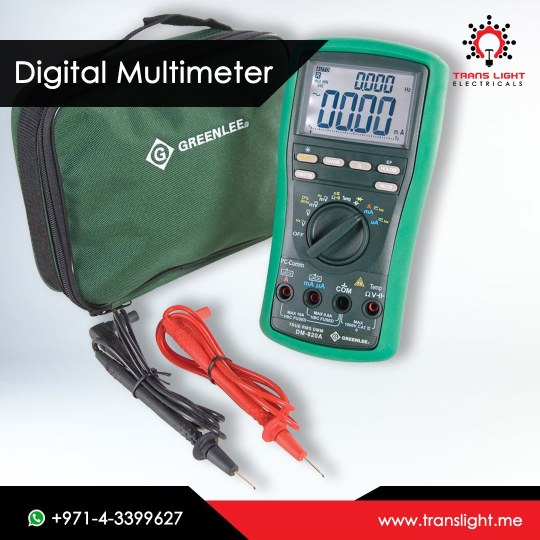
Looking for handheld digital multimeters in Dubai? Trans Light Electricals has you covered! Our cost-effective options meet the latest measurement and safety standards. Choose from a wide range of exclusive digital multimeters, ranging from basic instruments to high-accuracy count displays. Discover advanced features and reliable performance with us.
0 notes
Text
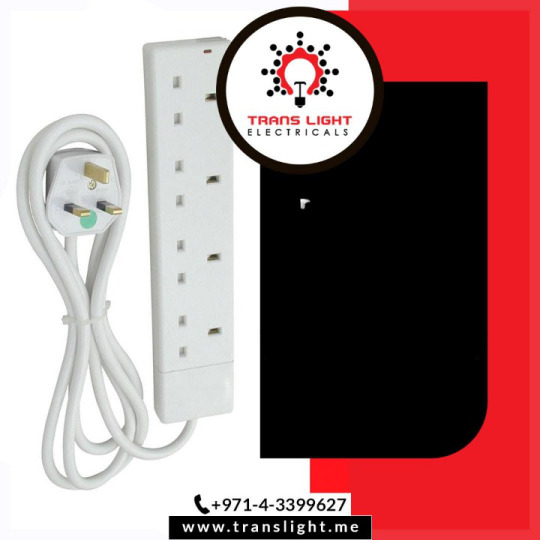
Are you in need of power extension cords in Dubai? Look no further than Trans Light! As a trusted company, we provide high-quality extension cords and reels made from durable plastic. Our products are designed to handle rigorous use and offer maximum safety through perfect insulation. Choose us for reliable solutions you can trust.
0 notes
Text
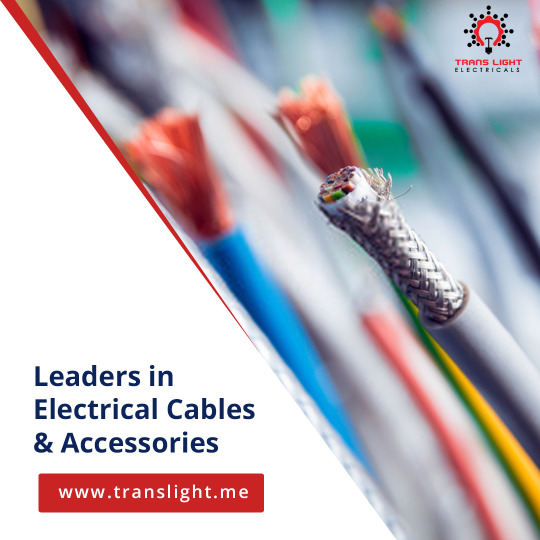
Looking for reliable electrical cable solutions in Dubai? Look no further than Trans Light Electricals! As a leading supplier and distributor, we provide a comprehensive range of wire and cable products for all your needs.
0 notes
Text

Looking for high-quality LED bulbs? Look no further than Translight - one of the top LED bulb suppliers in UAE! With longer life and higher output, our LED lamps are the perfect choice for your home or business. Order online now and experience the difference!
0 notes
Text

Are you looking for reliable and energy-efficient lighting solutions? Trans Light Electricals is your one-stop shop for all your fluorescent lamp needs in Dubai. We offer a range of compact and linear fluorescent lamps that provide overall lighting while saving on energy and costs. Our lamps work on the principle of electric discharge of gases, generating light through an electric arc in a tube filled with low-pressure mercury vapor and other gases. Trust Trans Light Electricals for the most popular and cost-effective lighting solutions for your commercial or residential space.
0 notes
Text
The Benefits of Using LED Bulbs for Your Lighting Needs
LED bulbs have become increasingly popular in recent years, and for a good reason. They are energy-efficient, long-lasting, and offer a range of benefits that traditional incandescent bulbs can't match. Translight offers various LED lamps and bulbs to meet your lighting needs. Visit our website to learn more about the benefits of LED Bulb and how they can save you money in the long run. Don't wait any longer to switch to LED lighting – start enjoying the benefits today.
0 notes